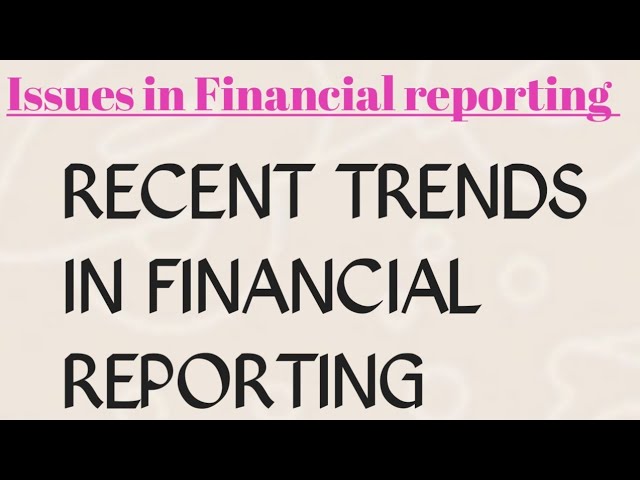Recent trends in financial reporting include increased focus on sustainability reporting, the adoption of technology such as blockchain and data analytics for enhanced transparency, and the move towards integrated reporting to provide a comprehensive view of a company’s performance. Financial reporting has seen a significant shift in recent years, with organizations emphasizing sustainability reporting, leveraging technology like blockchain for enhanced transparency, and moving towards integrated reporting to provide a holistic view of their performance.
These trends reflect a growing emphasis on environmental, social, and governance (ESG) issues, as well as the use of innovative tools to streamline reporting processes and provide stakeholders with a clearer understanding of a company’s financial and non-financial performance. As regulations and expectations continue to evolve, staying abreast of these trends is essential for organizations looking to demonstrate accountability and transparency in their reporting practices.
1. Increased Emphasis On Sustainability Reporting
In recent years, there has been a growing recognition of the importance of sustainability reporting in financial reporting. Companies and investors are increasingly considering the environmental, social, and governance (ESG) factors in their decision-making processes. This has led to the rise of ESG reporting and the significant impact of sustainable investing on financial reporting.
1.1 Rise Of Esg Reporting
ESG reporting has gained traction as companies recognize the need to address environmental and social risks and opportunities. ESG factors encompass a wide range of issues, including climate change, biodiversity, human rights, labour practices, and board diversity. By disclosing their ESG performance, companies provide investors and stakeholders with valuable insights into their sustainability practices.
ESG reporting goes beyond the traditional financial metrics and focuses on non-financial disclosures that impact a company’s long-term prospects. This transparent reporting helps investors make informed decisions and encourages companies to adopt sustainable practices. It also enables a better understanding of the company’s impact on the environment and society, promoting accountability and responsible business practices.
1.2 Impact Of Sustainable Investing
Sustainable investing, also known as socially responsible investing (SRI) or impact investing, has gained significant momentum in recent years. This approach considers environmental, social, and governance factors alongside financial returns when making investment decisions. The integration of sustainability considerations into investment strategies has brought about a paradigm shift in the financial industry.
Investors are increasingly looking for opportunities that align with their values and prioritize sustainability. By investing in companies with strong ESG performance, investors can influence corporate behaviour and contribute to positive social and environmental outcomes. This has led to the inclusion of ESG-related information in financial reports, allowing investors to assess the sustainability risks and opportunities associated with their investment portfolios.
The impact of sustainable investing extends beyond individual companies. It has spurred the development of new financial instruments, such as green bonds and social impact bonds, which generate capital for projects with environmental or social benefits. These instruments provide additional avenues for companies to raise funds and finance sustainable initiatives.
In conclusion, sustainability reporting has become a critical aspect of financial reporting, with the rise of ESG reporting and the influence of sustainable investing. Companies and investors alike are recognizing the value of transparently disclosing ESG performance and integrating sustainability considerations into their decision-making processes. This shift towards sustainability-focused reporting reflects a growing awareness of the need to address environmental and social challenges while ensuring long-term financial viability.

Credit: www.studypool.com
2. Adoption Of Integrated Reporting Frameworks
2.1 Combining Financial And Non-financial Information
Integrated reporting frameworks are gaining traction in recent financial reporting trends, highlighting the importance of combining both financial and non-financial information for a comprehensive understanding of a company’s performance.
This approach goes beyond the traditional focus on financial figures to encompass a broader spectrum of data, including factors related to sustainability, environmental impact, and social responsibility. By integrating these aspects, businesses can provide a more holistic view of their operations and performance.
Integrating financial and non-financial information in reporting offers a more accurate and balanced representation of a company’s value creation, enhancing the transparency of its operations and the impacts of its activities on various stakeholders.
2.2 Enhancing Transparency
Another significant aspect of the adoption of integrated reporting frameworks is the emphasis on enhancing transparency within financial reporting. By consolidating both financial and non-financial information, companies can offer a more comprehensive overview of their operations, addressing various stakeholders’ interests and concerns.
This approach not only fosters transparency but also strengthens the accountability of businesses regarding their social, environmental, and economic impacts. By providing a more holistic view of performance and impacts, companies can establish a foundation for building trust and credibility with stakeholders, including investors, customers, and regulatory authorities.
Embracing integrated reporting frameworks not only bolsters transparency within financial reporting but also underscores the significance of aligning business strategies with sustainable practices and responsible corporate behaviour.
3. Use Of Technology In Financial Reporting
Financial reporting has evolved significantly in recent years, thanks to advancements in technology. The use of technology in financial reporting has streamlined processes, improved accuracy, and provided valuable insights for decision-making. In this section, we will explore the recent trends in financial reporting related to the use of technology, including automation of reporting processes and the utilization of artificial intelligence.
3.1 Automation Of Reporting Processes
Automation of reporting processes has become a cornerstone of modern financial reporting. Through the use of advanced software and tools, organizations can streamline the collection, analysis, and presentation of financial data. Tasks that were once manual and time-consuming, such as data entry and report generation, can now be automated, allowing finance teams to focus on higher-value activities.
3.2 Utilization Of Artificial Intelligence
Artificial intelligence (AI) is revolutionizing financial reporting by enabling advanced data analysis and predictive capabilities. AI algorithms can sift through vast amounts of financial data to identify patterns, anomalies, and trends, providing invaluable insights for decision-makers. Additionally, AI-powered tools can assist in risk assessment, fraud detection, and forecasting, enhancing the overall accuracy and reliability of financial reports.

Credit: www.youtube.com
4. Shift Towards Real-time Reporting
Recent trends in financial reporting include a shift towards real-time reporting. This move enables companies to provide up-to-the-minute information, offering greater transparency and accuracy. Real-time reporting allows for more informed decision-making and enhances trust among stakeholders.
Real-time reporting has emerged as a significant trend in financial reporting, revolutionizing the way data is disseminated and analyzed. With advances in technology and the increasing need for up-to-the-minute information, organizations are shifting towards real-time reporting to gain a competitive edge in the market. This section will discuss the benefits of timely information dissemination and the challenges associated with real-time data updates.
4.1 Benefits Of Timely Information Dissemination
Timely information dissemination offers numerous advantages to businesses in the financial reporting landscape. Some key benefits include:
- Improved decision-making: Real-time reporting enables companies to make faster and informed decisions based on the most up-to-date information available.
- Increased transparency: By providing access to real-time financial data, organizations can foster trust among stakeholders and enhance transparency in their operations.
- Enhanced risk management: Timely information allows businesses to identify and mitigate risks promptly, reducing potential financial losses and adverse impacts.
- Better performance analysis: Real-time financial reporting enables organizations to monitor their performance metrics more effectively, identify areas of improvement, and make timely adjustments to achieve their goals.
- Greater investor confidence: With real-time reporting, investors gain immediate insight into a company’s financial health, enabling them to make well-informed investment decisions.
4.2 Challenges Of Real-time Data Updates
While real-time reporting offers significant advantages, it also presents some challenges that organizations need to address. These challenges include:
- Data accuracy and reliability: Real-time information requires a robust data collection and validation process to ensure accuracy and reliability.
- Data integration and compatibility: Organizations may face difficulties in integrating data from various sources and ensuring compatibility across different systems and platforms.
- Data security and privacy: With real-time reporting, there is a heightened need for robust security measures to protect sensitive financial information from unauthorized access and data breaches.
- Technological infrastructure: Implementing real-time reporting requires a robust and scalable technological infrastructure to handle high volumes of data in real-time.
- Training and skills development: Organizations need to invest in training their employees to effectively utilize real-time reporting tools and analyse the dynamic financial data.
In conclusion, the shift towards real-time reporting in financial reporting brings forth numerous benefits, including improved decision-making, increased transparency, enhanced risk management, better performance analysis, and greater investor confidence. However, organizations must also address challenges such as data accuracy, integration, security, technological infrastructure, and workforce skills to fully leverage the potential of real-time reporting.
5. Focus On Narrative Reporting
Narrative reporting is a key trend in financial reporting, enhancing transparency and stakeholder engagement.
5.1 Importance Of Providing Contextual Information
Contextual information in financial reporting offers clarity for stakeholders, aiding better decision-making.
5.2 Enhancing Communication With Stakeholders
Effective communication with stakeholders through narrative reporting builds trust and long-term relationships.
6. Embracing International Financial Reporting Standards (ifrs)
Embracing International Financial Reporting Standards (IFRS) is a key trend in modern financial reporting practices. Let’s delve into the impact of IFRS on global harmonization and comparability.
6.1 Global Harmonization Of Reporting Practices
IFRS promotes consistent reporting practices across borders, fostering a harmonized global financial landscape.
6.2 Impact On Comparability And Consistency
IFRS enhances the comparability and consistency of financial statements, enabling stakeholders to make informed decisions.
7. Evolution Of Non-financial Reporting Requirements
Non-financial reporting requirements have evolved significantly in recent years, reflecting growing concerns about environmental, social, and governance (ESG) issues. Companies are increasingly expected to disclose non-financial information to meet the demands of stakeholders, regulators, and investors. This trend emphasizes the importance of transparency and accountability in financial reporting.
- In recent years, financial reporting has undergone significant changes, as organizations have realized the importance of transparency and accountability beyond monetary figures. With a growing emphasis on environmental and social responsibility, non-financial reporting requirements have evolved to provide a holistic view of a company’s performance. Let’s delve into two key aspects of this evolution in non-financial reporting – Scope Expansion beyond Financial Data and Addressing Environmental and Social Performance.
7.1 Scope Expansion Beyond Financial Data
In the past, financial reporting mainly revolved around presenting numbers concerning a company’s revenue, profits, and expenses. However, a new trend has emerged in recent times – an expansion of the scope to include non-financial data. This includes information about a company’s environmental impact, social initiatives, employee well-being, and corporate governance practices. By broadening the reporting landscape, organizations are giving stakeholders a more comprehensive understanding of their operations and overall sustainability efforts.
7.2 Addressing Environmental And Social Performance
As concerns about climate change and social impact have risen, there has been a growing demand for companies to disclose their environmental and social performance. Non-financial reporting now lies at the heart of this effort. Companies are expected to address their environmental practices, such as energy consumption, waste management, and carbon emissions. Additionally, they are encouraged to demonstrate their commitment to social responsibility by reporting on topics like diversity and inclusion, employee volunteering, and community involvement.
To meet these evolving reporting requirements, companies are implementing robust systems and frameworks. For instance, the Global Reporting Initiative (GRI) provides a comprehensive set of guidelines for reporting on economic, environmental, and social aspects, allowing organizations to align their reporting with internationally recognized standards.
The evolving landscape of non-financial reporting not only provides stakeholders with a more holistic picture of a company’s performance but also drives organizations to become more accountable for their environmental and social impacts. As this trend continues to gain momentum, it becomes increasingly vital for companies to embed sustainability practices into their core strategies and effectively communicate their progress through transparent and comprehensive reporting mechanisms.

Credit: www.semanticscholar.org
Frequently Asked Questions On Discuss What Are The Recent Trends In Financial Reporting
What Are The Recent Trends In Presenting The Financial Statements?
Recent trends in presenting financial statements include the use of visual elements like graphs and charts for enhanced data visualization. Additionally, there is a move towards providing more detailed and comprehensive footnotes to enhance transparency. Another trend is the adoption of digital formats to improve accessibility and interactivity.
What Is Trend Analysis In Financial Reporting?
Trend analysis in financial reporting involves tracking and analyzing data to identify patterns and predict future financial performance. It helps in making informed decisions and strategic planning based on historical trends in financial data.
What Are The Recent Developments In Corporate Financial Reporting?
Recent developments in corporate financial reporting include increased focus on sustainability reporting, adoption of digital tools for data analysis, and integration of technology for real-time reporting. Enhanced transparency and disclosure practices are also being emphasized to improve stakeholder engagement and decision-making processes.
What Is Management Reporting And Recent Trends In Management Reporting?
Management reporting is the process of gathering and analyzing data to provide insights on organizational performance. Recent trends include the use of cloud-based tools, real-time reporting, and interactive dashboards for better decision-making.
What Are The Latest Technology Advancements Impacting Financial Reporting?
Technology like AI and blockchain revolutionize data accuracy and efficiency in reporting.
Conclusion
Financial reporting has undergone significant changes in recent years. The growing use of technology and automation has led to more efficient and accurate reporting processes. Additionally, there has been a shift towards greater transparency and disclosure, with companies providing more detailed information to stakeholders.
These trends reflect the evolving needs of investors and regulators in an increasingly complex and globalized marketplace. As financial reporting continues to adapt to these changes, it is important for organizations to stay up-to-date with the latest trends to ensure compliance and enhance decision-making.



